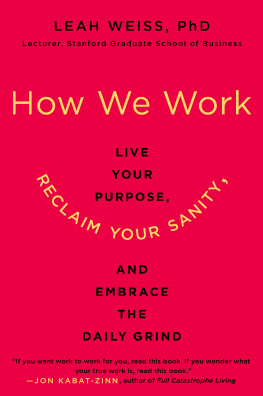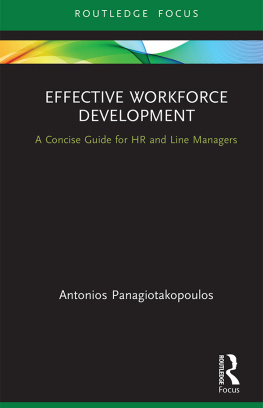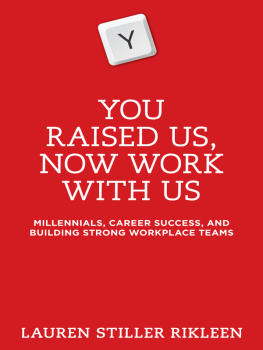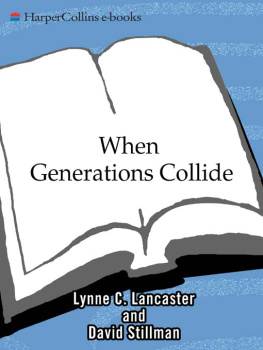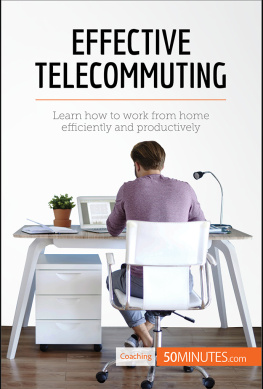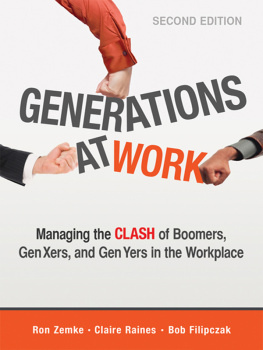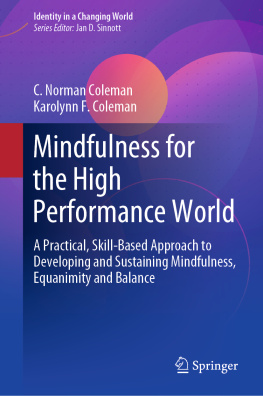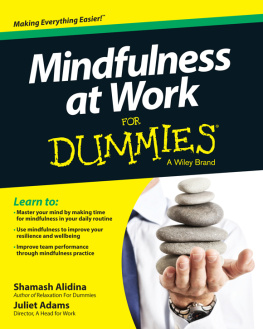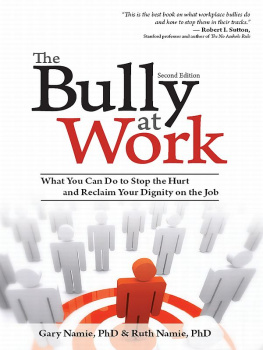Leah Weiss - How We Work: Live Your Purpose, Reclaim Your Sanity, and Embrace the Daily Grind
Here you can read online Leah Weiss - How We Work: Live Your Purpose, Reclaim Your Sanity, and Embrace the Daily Grind full text of the book (entire story) in english for free. Download pdf and epub, get meaning, cover and reviews about this ebook. year: 2018, publisher: HarperCollins, genre: Religion. Description of the work, (preface) as well as reviews are available. Best literature library LitArk.com created for fans of good reading and offers a wide selection of genres:
Romance novel
Science fiction
Adventure
Detective
Science
History
Home and family
Prose
Art
Politics
Computer
Non-fiction
Religion
Business
Children
Humor
Choose a favorite category and find really read worthwhile books. Enjoy immersion in the world of imagination, feel the emotions of the characters or learn something new for yourself, make an fascinating discovery.
- Book:How We Work: Live Your Purpose, Reclaim Your Sanity, and Embrace the Daily Grind
- Author:
- Publisher:HarperCollins
- Genre:
- Year:2018
- Rating:5 / 5
- Favourites:Add to favourites
- Your mark:
How We Work: Live Your Purpose, Reclaim Your Sanity, and Embrace the Daily Grind: summary, description and annotation
We offer to read an annotation, description, summary or preface (depends on what the author of the book "How We Work: Live Your Purpose, Reclaim Your Sanity, and Embrace the Daily Grind" wrote himself). If you haven't found the necessary information about the book — write in the comments, we will try to find it.
I have long thought that what the Buddha taught can be seen as a highly developed science of mind which, if made more accessible to a lay audience, could benefit many people. I believe that Dr. Weisss book, in combining such insights with science and good business practice, offers an effective mindfulness based program that many will find helpful. His Holiness, the Dalai Lama
A practical guide to bringing our whole selves to our professional work, based on the authors overwhelmingly popular course at the Stanford Graduate School of Business.
In todays workplace, the traditional boundaries between work and personal are neither realistic nor relevant. From millennials seeking employment in the sharing economy to Gen Xers telecommuting to Baby Boomers creating a meaningful second act, the line that separates who we are from the work we do is blurrier than ever.
The truth is, we dont show up for our jobs as a portion of ourselvesby necessity, we bring both our hearts and our minds to everything we do. In How We Work, mindfulness expert and creator of the perennially-waitlisted Stanford Business School course Leading with Mindfulness and Compassion Dr. Leah Weiss explains why this false dichotomy can be destructive to both our mental health and our professional success.
The bad news, says Weiss, is that nothing provides more opportunities for negative emotionsanxiety, anger, envy, fear, and paranoia, to name a fewthan the dynamics of the workplace. But the good news is that these feelings matter. How we feel at and about work mattersto ourselves, to the quality of our work, and ultimately to the success of the organizations for which we work.
The path to productivity and success, says Weiss, is not to change jobs, to compartmentalize our feelings, or to create a false professional identitybut rather to listen to the wisdom our feelings offer. Using mindfulness techniques, we can learn how to attend to difficult feelings without becoming subsumed by them; we can develop an awareness of our bigger picture goals that orients us and allows us to see purpose in even the most menial tasks. In How We Work, Weiss offers a set of practical, evidence-based strategies for practicing mindfulness in the real world, showing readers not just how to survive another day, but how to use ancient wisdom traditions to sharpen their abilities, enhance their leadership and interpersonal skills, and improve their satisfaction.
Leah Weiss: author's other books
Who wrote How We Work: Live Your Purpose, Reclaim Your Sanity, and Embrace the Daily Grind? Find out the surname, the name of the author of the book and a list of all author's works by series.

